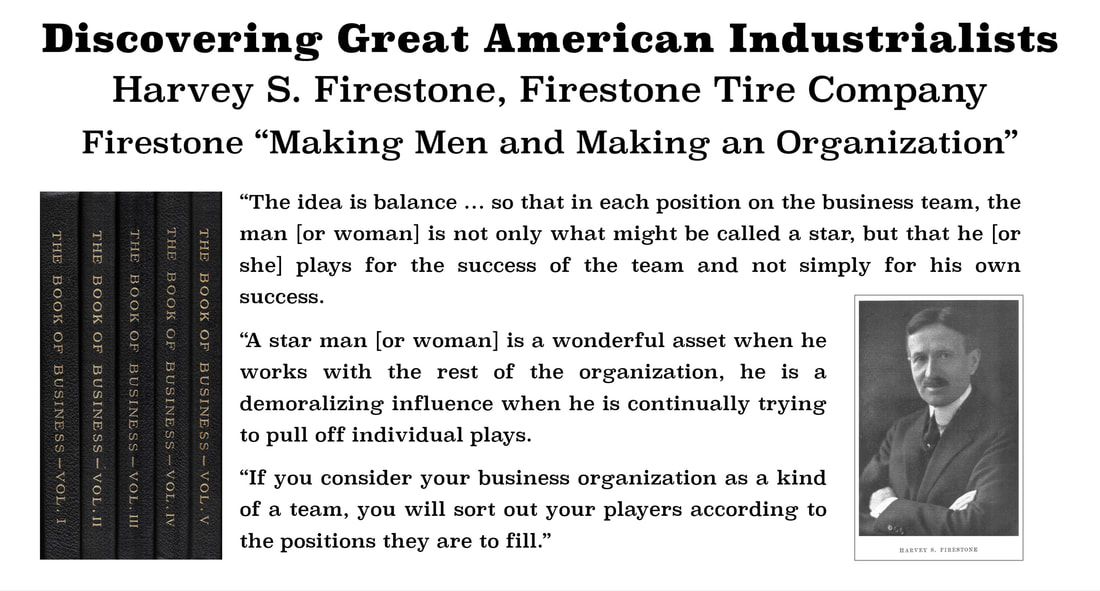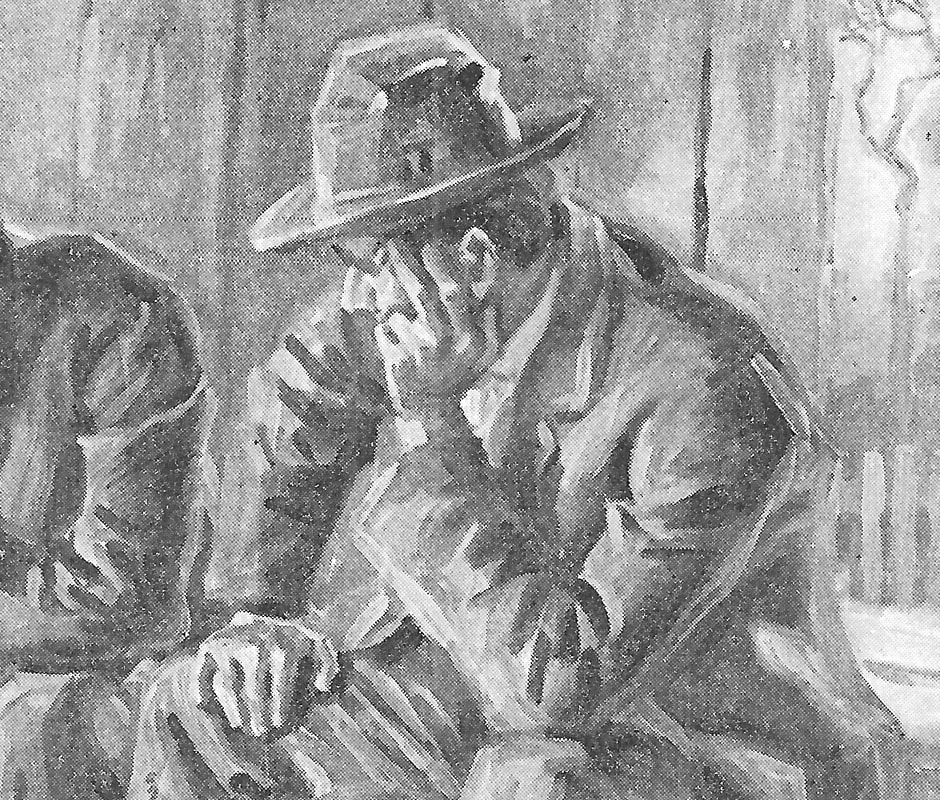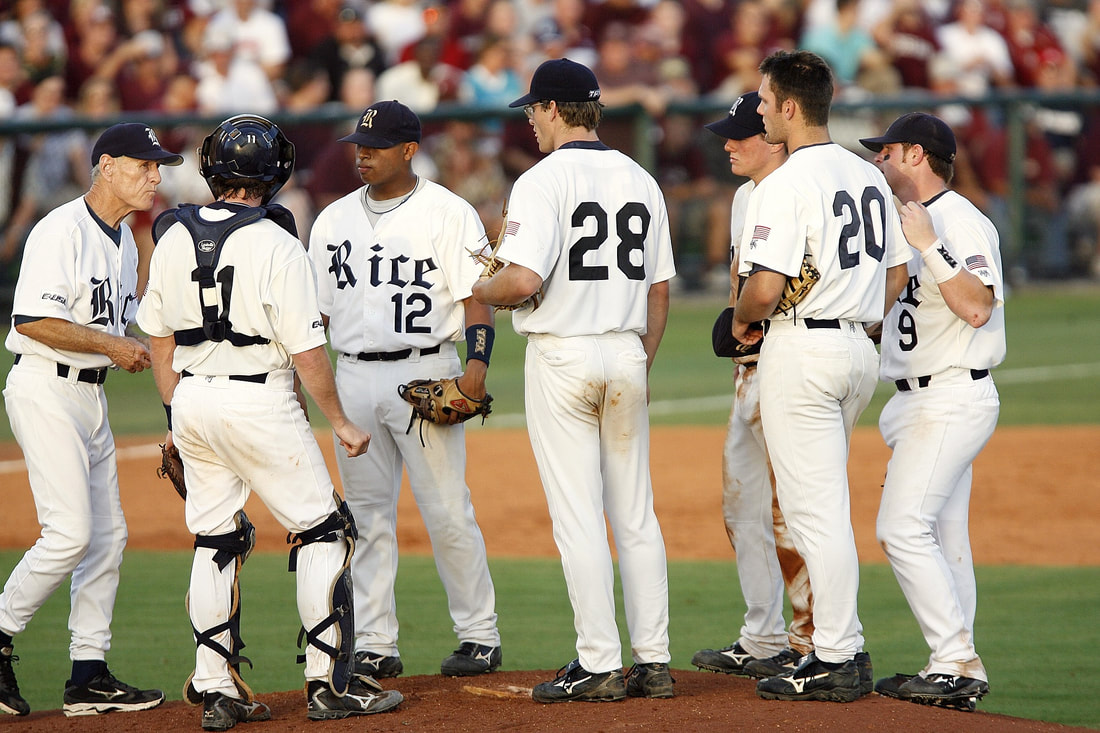Harvey S. Firestone: "Hiring to Build an Organization"
|
|
Date Published: June 29, 2021
Date Modified: June 30, 2024 |
"A realization of personal imperfection may be the first thought to bear in mind in organization making, for it is not well to forget that the component parts of a human organization are human. They are not and never can be quite perfect. The unattainability of perfection does not mean it should not be eagerly pursued—that one should be easily satisfied.
"There should be no lack of striving toward perfection, but the humanness of human beings is not to be forgotten."
"There should be no lack of striving toward perfection, but the humanness of human beings is not to be forgotten."
Harvey S. Firestone, "Making Men and Making an Organization," 1920
Harvey S. Firestone: "On Hiring Employees to Build an Organization"
|
In recent years I, of course, have personally engaged only the highest executives, but in my time, I have employed many thousands of men and promoted hundreds, perhaps thousands, of others.
I have not used any formula, and I am quite convinced that employees are not to be selected by automatic, self-acting means. It is always a matter of exercising proper judgment. My own method is to ask a great many questions and then to get a line of the man's character, by the manner of his answers, rather than by the answers themselves. I might ask a boy about his grandparents, not because I was unduly concerned about his grandparents, for it is the boy and not the grandparents I expect to have work for me, but a deal may be learned simply from how he talks about his elders. |
Ask a lot of questions and watch the manner of answering
|
In the same way questions concerning school and high school, when he left and what he did, are all of use as indicating the attitude toward learning and as an exposition of his power of reason and analysis.
When I am through, I have a very fair estimate of the applicant's energy, persistence, straightforwardness, and ambition—which are after all the fundamental qualities. I want to see how he acts with me, whether he watches me suspiciously or whether he watches me in order to try to estimate what I am thinking about. It is very bad for a man to be eternally suspicious, but it is very good for him to keep close watch on what the other man is doing so that he may take advantage of openings.
In the first case the man is distrustful; in the second case he is making a study of the work before him, which work is selling himself.
There are a lot of other things that can be brought out in this personal examination—the use of the eyes, for instance. It is extremely awkward to have a man looking you straight in the eye all the time in spite of what the copy books say to the contrary.
It is the expression with which he looks rather than the amount that he looks that counts.
Then there are nervous affections. A man being discussed for his first job should, I think, be nervous, but there is a deal of difference again between the nervousness of energy and the ordinary kind of irritated nervousness. Constructive nervous energy is the most vital of assets, but then there is the nervous energy which wastes itself in jumping from one foot to the other. A man with that kind of energy is a nuisance anywhere.
But summarizing, my decision depends upon the impression that the man makes on us—the way he sells himself. They do not all have to make the same kind of an impression, because there are a considerable number of varieties of very good men.
When I am through, I have a very fair estimate of the applicant's energy, persistence, straightforwardness, and ambition—which are after all the fundamental qualities. I want to see how he acts with me, whether he watches me suspiciously or whether he watches me in order to try to estimate what I am thinking about. It is very bad for a man to be eternally suspicious, but it is very good for him to keep close watch on what the other man is doing so that he may take advantage of openings.
In the first case the man is distrustful; in the second case he is making a study of the work before him, which work is selling himself.
There are a lot of other things that can be brought out in this personal examination—the use of the eyes, for instance. It is extremely awkward to have a man looking you straight in the eye all the time in spite of what the copy books say to the contrary.
It is the expression with which he looks rather than the amount that he looks that counts.
Then there are nervous affections. A man being discussed for his first job should, I think, be nervous, but there is a deal of difference again between the nervousness of energy and the ordinary kind of irritated nervousness. Constructive nervous energy is the most vital of assets, but then there is the nervous energy which wastes itself in jumping from one foot to the other. A man with that kind of energy is a nuisance anywhere.
But summarizing, my decision depends upon the impression that the man makes on us—the way he sells himself. They do not all have to make the same kind of an impression, because there are a considerable number of varieties of very good men.
|
The thought in this hiring, however, is not merely to get a capable man. A man may very well be capable and yet not fit into my organization.
A business organization is a business team, and there are particular places on that team to be filled. For instance, nine star pitchers would not make a first-class baseball nine, neither would nine of any other kind of players all of whom were capable in only the one position. You could not have a first-class business organization entirely composed of salesmen, or of engineers, or of accountants. |
If everyone is a pitcher, who's left to field?
|
The idea is to balance so that in each position on the business team the man is not only what might be called a star, but that he plays for the success of the team and not simply for his own success. A star man is a wonderful asset when he works with the rest of the organization, he is a demoralizing influence when he is continually trying to pull off individual plays.
A business organization made up of second-class men all working together will be more effective than one made up of stars who work only for themselves. If you consider your business organization as a kind of a team, you will sort out your players according to the positions they are to fill.
A business organization made up of second-class men all working together will be more effective than one made up of stars who work only for themselves. If you consider your business organization as a kind of a team, you will sort out your players according to the positions they are to fill.


